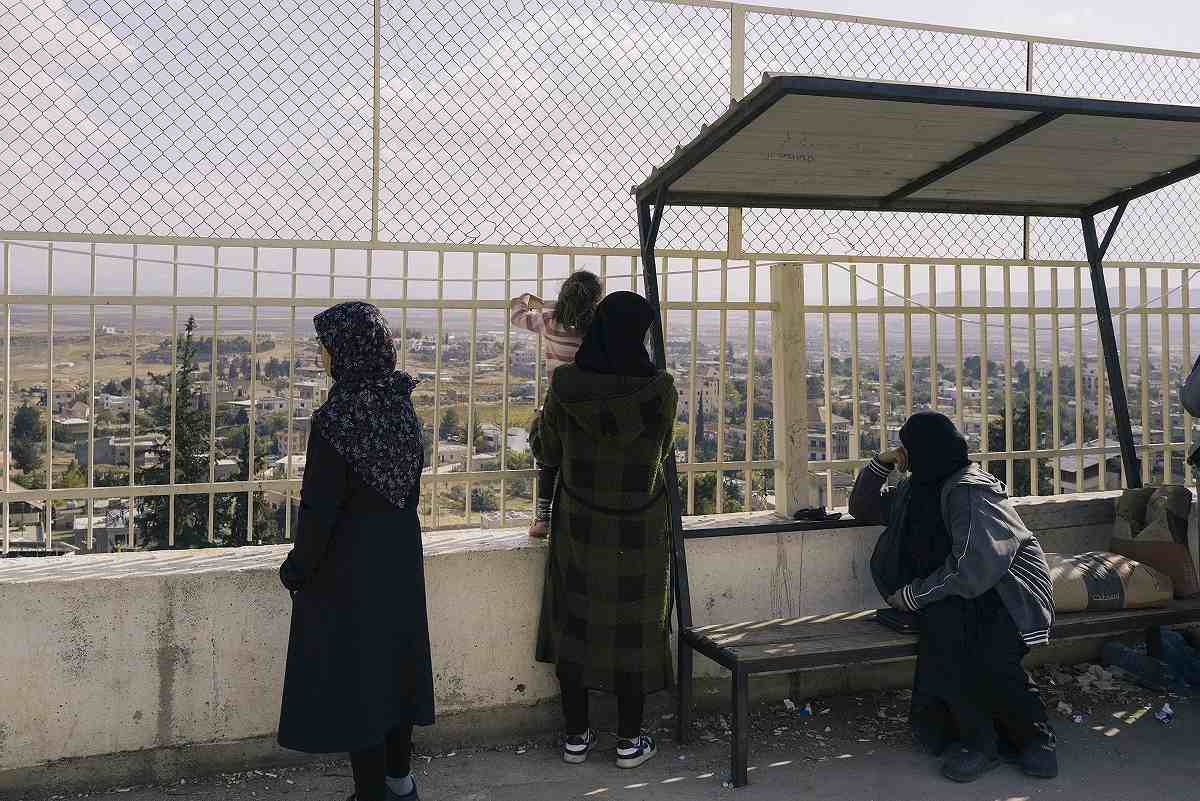
Women watch the bombing of Baalbek from a school in Deir al-Ahmar where they took shelter.
16:32 JST, November 1, 2024
DEIR AL-AHMAR, Lebanon – From a hilltop schoolyard in this northeastern town, some of the tens of thousands who had fled Baalbek watched the fireball from an Israeli strike fill the sky above their ancient city.
That moment on Wednesday was one of shock and disbelief, they said, coming just hours after the Israeli military had ordered the city’s entire population of 80,000 – and those of its surrounding villages – to flee.
“We never thought that could happen here, not to us,” said Zahra Younes, 31. She was sheltering Thursday with her five children in a public school building in Deir al-Ahmar, a majority-Christian town about 10 miles from Baalbek.
The family was exhausted, their nerves shredded. The night before, Younes’s 7-year-old son, Amin, had been so scared by the bombing that he swallowed his tongue and required resuscitation. Her toddler, Adam, put his hand to his chest as the strikes boomed out and said: “My heart.”
Baalbek, famed for its well-preserved Roman ruins, had largely been spared the barrage of attacks in Lebanon. In the south, Israeli troops are trying to uproot Hezbollah militants, using tanks, drones, bulldozers and fighter jets to push the group back from Israel’s northern border.
But the strikes had drawn closer to Baalbek this week, killing 60 in the surrounding region on Monday, two days before Israel’s warning that civilians should fully evacuate as the military prepared to “act forcefully against Hezbollah interests in your city and villages.”
On Thursday, thousands of the displaced were packed into schools and apartments and living on sidewalks in Deir al-Ahmar. Some shivered in the mountain cold because they had only the clothes on their backs; others were stiff and bruised from a night of fitful sleep on classroom floors.
George Berkachi, a 21-year-old physical education teacher from Deir al-Ahmar, leaned up against the bars on the schoolyard’s gate, which framed the villages under assault miles below. “That one, that one, to that one,” he said, drawing a line with his finger across the horizon. “They’re all in the red zone. No one here can sleep anymore.”
The Israeli military’s intense focus on Baalbek, for a second day, came as six paramedics were killed Thursday in separate Israeli attacks in southern Lebanon, according to the Lebanese Health Ministry.
One Lebanese paramedic was killed and two injured in the town of Zefta. Another was killed and two others injured in Deir al-Zahranil, and four were killed in Dardghaya, the ministry said. The Israeli military did not respond to a request for comment on the attacks.
According to the Health Ministry, 178 paramedics have been killed and 279 wounded over the past year. A Human Rights Watch report released Wednesday said Israeli forces have repeatedly attacked medical workers and health-care facilities in Lebanon. It said the attacks included apparent war crimes.
At least 2,867 people have been killed and 12,937 injured in Lebanon since the conflict began in October 2023, the Health Ministry says. But war has immersed the country in stages.
It began when Hezbollah fired rockets at northern Israel in solidarity with Hamas after the Oct. 7 attacks. The rockets were the opening salvo of a creeping but contained conflict that forced tens of thousands of people from their homes on both sides of the border.
Then last month came a sudden escalation, as Israel launched an attack on Hezbollah’s communications devices, dramatically expanded its aerial assault on Lebanon, assassinated most of Hezbollah’s senior leadership, and sent troops into the south of the country for the first time since 2006.
On the road into Deir al-Ahmar, dusty cars sat in clusters, with elderly women and young children slumped in the front and back seats, surrounded by bags of clothes and food. “They’re all strangers,” said one resident, eyeing them warily. Aid workers described chaos on the same road the night before: The displaced slept in their cars, or on sidewalks.
“People were crying – it was the first time the town had been this full,” said Elias Saade, a volunteer with the Caritas aid group. His team of 13 volunteers finished work at 1 a.m., after making and handing out 500 sandwiches. They had supplies to provide the newcomers with only one meal a day, and many were otherwise going hungry.
In the distance, a dark plume of smoke from an airstrike stood out against the hazy gray clouds over the village of Bodin, nine miles northwest of Baalbek. One of the strikes visible from Deir al-Ahmar on Wednesday hit a fuel storehouse in another village, causing a ball of flames to blossom through the sky.
The Israeli army said it struck “military compounds” belonging to a Hezbollah logistics unit. “The unit is responsible for transferring weapons from Iran and its proxies to Hezbollah in Lebanon,” the statement said, adding that the fuel was “supplied by Iran.” It was not immediately possible to verify that claim.
Bilal Raad, head of the region’s civil defense force, said that the Baalbek evacuation order had included his team’s headquarters but that they were still working. The city was mostly empty, he said, although some residents had returned after failing to find somewhere to stay. The regional governor, Bachir Khodr, urged people not to shelter within the city’s Roman ruins after some residents fled there believing them safe.
UNESCO, the U.N. cultural and scientific organization, said Thursday that the first remote analysis of satellite imagery, as well as information from site managers, had not identified any visible damage to the Baalbek site. Still, the agency said it hoped to carry out more-precise inspections when the situation permitted.
Up in Deir al-Ahmar, there were people with families divided – some now homeless in the schoolyard, others still in Baalbek and its surrounding villages, refusing to leave. “I’ve been calling them since yesterday, but they won’t evacuate,” said 49-year old Tahani Lakiss.
The Israeli military had issued a second evacuation order for Baalbek an hour earlier, and her anxiety was mounting, she said. In the schoolyard around Lakiss, children scampered about, trying to make fun without toys. Zahra Shalhoub, 2, asked her father, Mohammed, if he had any. He shook his head. Another young girl tied a piece of string to a pole and skipped around it.
Mohammed, 32, said his wife, Hamda Nassif, 24, was entering her final month of pregnancy with their second child. She had miscarried twice before, and now he feared for her again. The family had been displaced repeatedly, first from southern Lebanon and now from the Baalbek area, and he didn’t know if they still had the funds to pay for a Caesarean section.
The civil defense force said late Tuesday that it had retrieved eight bodies from across the Baalbek-Hermel region, and had pulled 10 wounded from the rubble. Residents from Bodin said some of them were their friends – a couple with two children. “They had gone back to collect some belongings,” said Reema Assef, a young woman who had fled the village the day before with her sisters.
They had slept that night on a thin mattress, without blankets. Photos on the women’s phones revealed the beauty of their home village. There were images from before: fruit trees, a sunrise, exam revision notebooks with cups of dark coffee. And after: explosions, not far from the house.
The sisters’ father, Khalil, had died four months earlier, and what space they had left for grief was now filled by worries for their own survival, they said.
When they left Bodin, they had left their father’s grave behind. They said they heard a rumor that it was destroyed by an Israeli airstrike. Reema’s sister Zeinab said her heart felt “black.”
“It’s not with anger – it’s with sadness,” she said.
Top Articles in News Services
-

Survey Shows False Election Info Perceived as True
-

Hong Kong Ex-Publisher Jimmy Lai’s Sentence Raises International Outcry as China Defends It
-

Japan’s Nikkei Stock Average Touches 58,000 as Yen, Jgbs Rally on Election Fallout (UPDATE 1)
-

Japan’s Nikkei Stock Average Falls as US-Iran Tensions Unsettle Investors (UPDATE 1)
-

Trump Names Former Federal Reserve Governor Warsh as the Next Fed Chair, Replacing Powell
JN ACCESS RANKING
-

Producer Behind Pop Group XG Arrested for Cocaine Possession
-

Japan PM Takaichi’s Cabinet Resigns en Masse
-

Man Infected with Measles Reportedly Dined at Restaurant in Tokyo Station
-

Israeli Ambassador to Japan Speaks about Japan’s Role in the Reconstruction of Gaza
-

Videos Plagiarized, Reposted with False Subtitles Claiming ‘Ryukyu Belongs to China’; Anti-China False Information Also Posted in Japan























